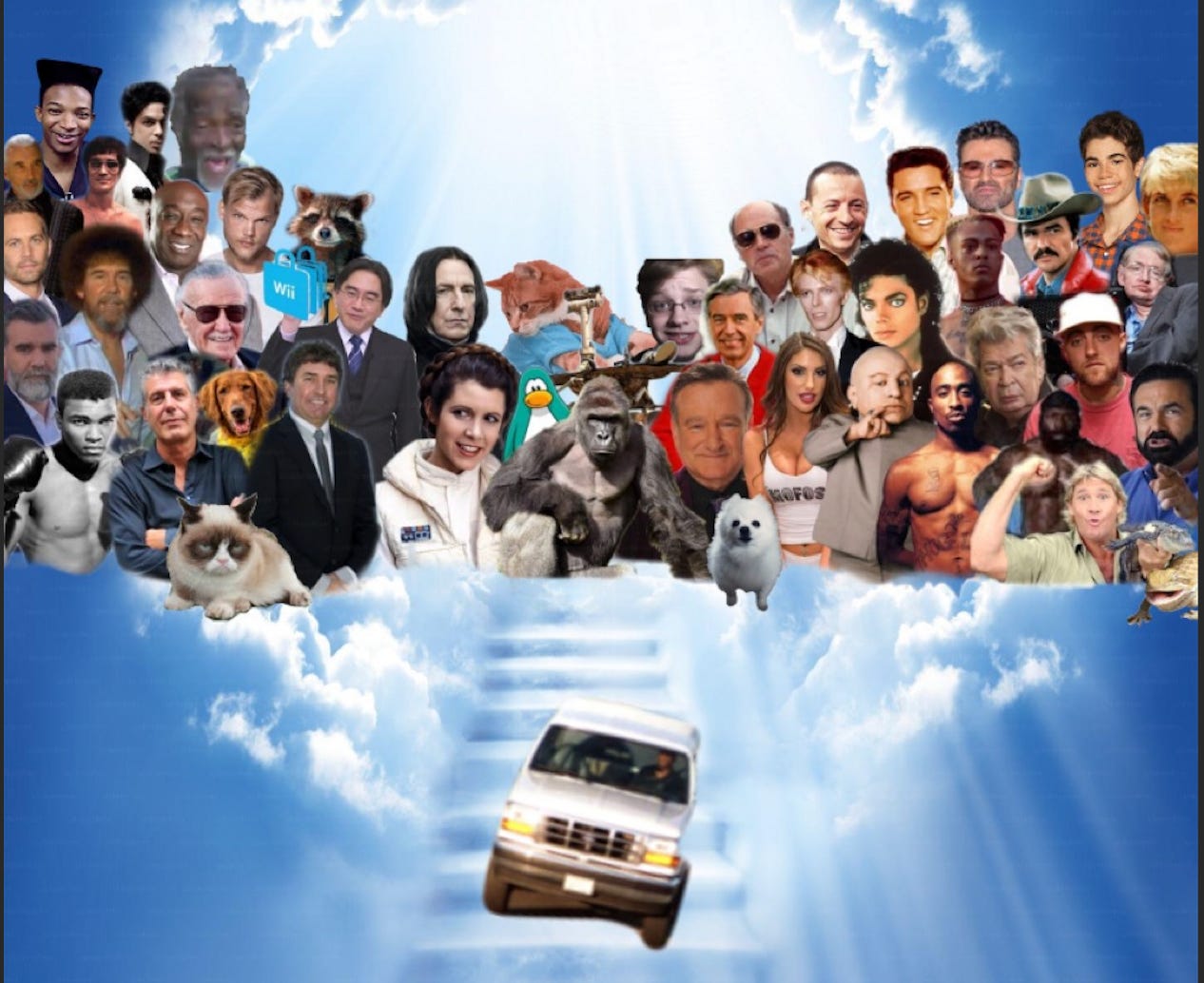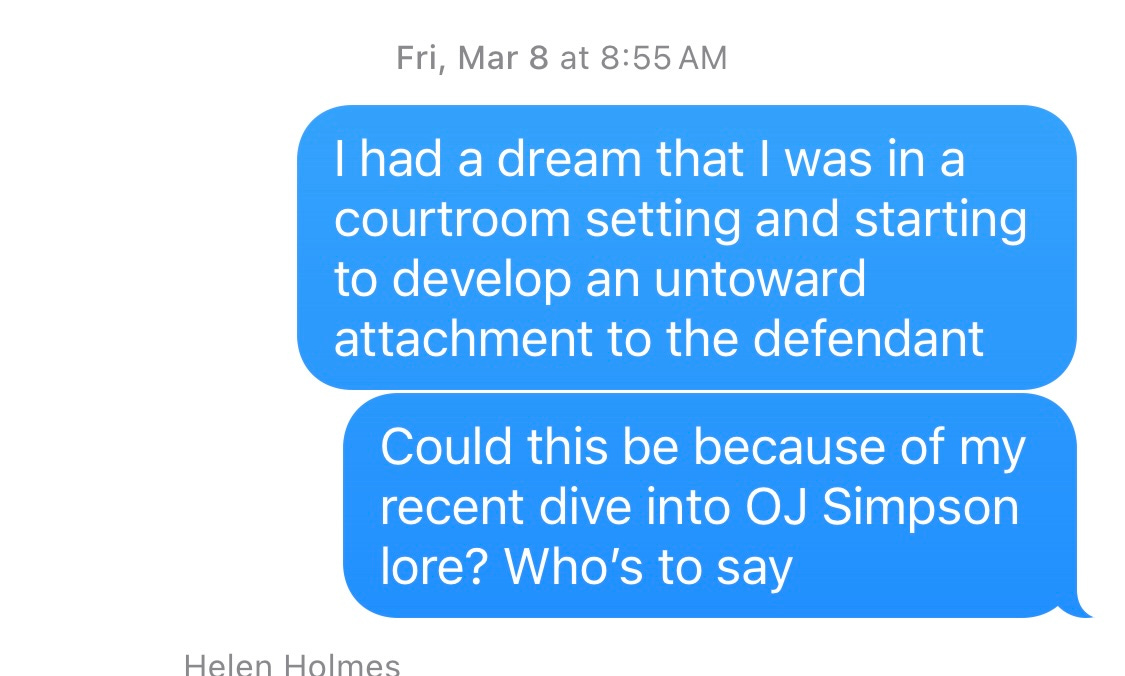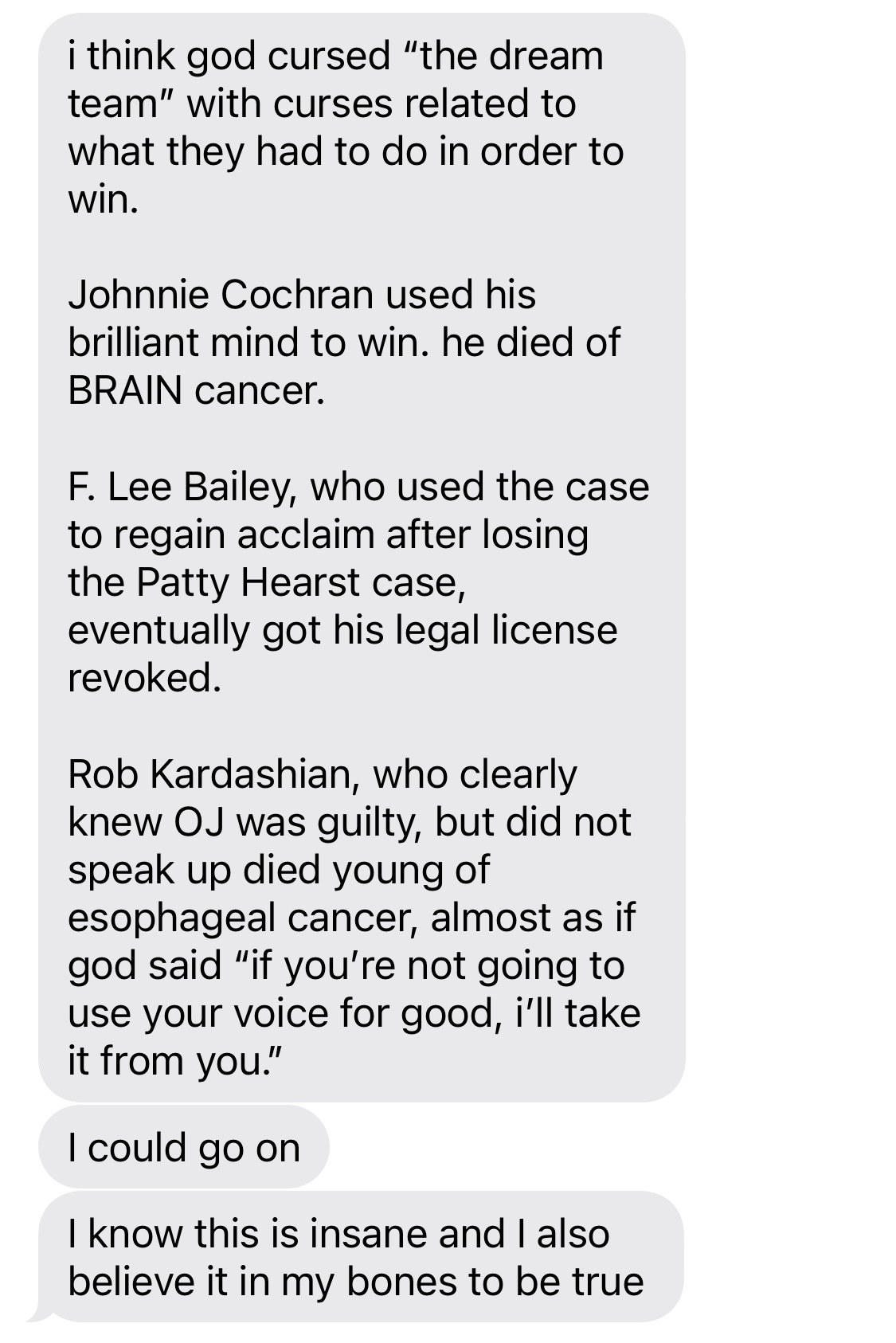I became obsessed with O.J. Simpson approximately six weeks ago, because I’m either psychic, mentally unwell, or a somehow worse combination of both. In fact, my knowledge of O.J. Simpson six weeks ago was so sparse that I actually said to two different group texts, “so like, is the consensus that he did it?”
It’s wild to think I knew a time (just six weeks ago!) when my conception of O.J. Simpson was anything other than OF COURSE he did it. Past hour one, learning about the trial wasn’t even an exercise in answering that question. Everything I read past that first hour was rather an exercise in the how, the why, an education in the surrounding American moment that produced it, and every absurd micro-moment that happened as a result.
I certainly had no idea that O.J. would be dead in six weeks. This current relevancy had nothing to do with my deep dive; in fact, his then-relative-irrelevancy was more of a trigger. I’d been needing obsessions that had nothing to do with my immediate vicinity, and that vicinity includes whatever is currently popular on the internet.
I’d come to a point in my life where I was starting to become convinced that the upward trajectory I’d imagined existing in terms of professional mobility, stability, and general happiness was in fact a facade, much like the one Obama so optimistically spoke of, of the universe bending on a moral arc towards progress. I got my first full time job and lost it six months later, putting me in a somehow more desperate financial and existential situation than I’d already been in for two unemployed years before said job. Two of my close friends, both young and seemingly healthy, had died within the span of a few weeks. No matter what I did to engender a sense of stability and safety in my life, it seemed like the universe was telling me not to bother, nothing would come of any effort, either positive or negative, if such classifications can be applied to life’s efforts. All the illusions I’d had of stability had vanished. At first, I was concentrating on the outer illusions, but there were inner ones too — you’ll see that as we go along.
Depending on how you look at it, I was and am handling grief, unemployment and existential uncertainty either very badly or very well. Badly in the sense that sometimes my anxiety intensifies to the point that instead of being productive, all I can do is become an expert on O.J. Simpson. Well, in the sense that I’m becoming an expert on O.J. Simpson instead of indulging in substance abuse, partying and risky sex behaviors, or any type of self harm.
I started texting my family things like “only thing that comforts me now is watching david schwimmer as robert kardashian.” O.J. Simpson, the dream team, the prosecution, the minor characters – all of them became an escape hatch from my own desperation.
When I’m in these lowest moments, (lowments? lol,) watching an O.J. show, reading books about the trial, reading Chris Darden’s Reddit AMA — these activities simply make me feel better. They make me feel held in a bath. My brian is in the vat and I am allowed a moment of contentment. I don’t know why a thirty-year-old crime does that to me. When I start to feel panicky, I pick up my iPad, which I mostly use as a kindle, and I return to Marcia Clark driving back and forth between her waterlogged house and the DA’s office, single-mothering two young children while trying the case of the century, and for a moment everything I’m afraid of fades, because I’m safe in the house that O.J. built.
🧤
And now, O.J. Simpson is dead. Time as the flat circle strikes again.
I wondered if this was coming when I saw reports of his cancer, but I assumed there was a bit longer to go. This isn’t to say I hoped he had longer on the earth, because, lol, but I did envision more of a lead up in terms of the public having a chance to beg him for a deathbed confession.
My conspiracy brain is out here saying, well, that’s probably why the family kept it relatively quiet. You know that man wouldn’t have been able to resist a final public baiting. His children were probably like…absolutely not.
A question I’ve been asking myself since the beginning of my obsession is, how do you reckon with something that is simultaneously so fascinating and disturbing? How do you reckon with your own indulgence?
I’ll admit, in the beginning, a little, no, a medium part of me, liked O.J. and wished for him to be innocent. I won’t say I felt bad for him, I have a hard time feeling bad for anyone who has accumulated enough power to subvert any kind of justice, murder accusation or otherwise, but I did have some weird form of affection. There must have been another suspect, another narrative.
There was no other suspect, there was no other narrative. I learned that quickly in my education. Nicole wasn’t killed by drug dealers who she borrowed money from to open a Starbucks with Faye Resnick. (A real claim made by the O.J. camp!)
My affection luckily morphed into a lull of calm brought on by anything associated with the phenomena itself rather than the man at its center. Like a rat tapping the food lever, I’m calmed by hearing the words Bundy or Rockingham. In my brain bath, I am more comforted by the reveal of a new piece of trivia about the Fuhrman tapes than I am by listening to a tape of O.J.’s voice. This is comforting now, to know that I was able to make my consumption less inspid and more acceptable, but in the deepest throes of my psychosis, I didn’t care.
When a cultural phenomenon becomes so big that it eclipses its own specifics, I understand how misinformation spreads and rumors become acceptable currency. Take Ron Goldman and Nicole Brown’s relationship, for example. The idea that Ron and Nicole may have been sleeping together seemed like a common enough theme in the cultural symphony that surely, it was possible.
But there was little to no evidence that they’d ever been romantically involved. And yet, the idea that they had been was common enough that I assumed it was true, or at least possibly true, before becoming an obsessive of the specifics. And that was only in my one individual mind. Broadly, this was on the national scale, everyone reading and watching the story unfold at every moment of the day, not a girl alone in her bedroom with ample texts and records to cross reference. When you’re starting out with a false presumption, it’s not so strange that the logical leaps create emotional fallacies.
In these moments, you see how a story overpowers a fact. We fall in love with a story and if the story makes sense, it’s easy to ignore not only facts, but also morality and logic. There were moments I caught my brain trying to do a little circus act, like, well, maybe they were having an affair! But then I caught said brain, and was like … oh my god, and so what if they were? Where in the victim-blaming-misogyny-pilled world did my brain of all brains even pick up that thread?
It doesn’t matter if a divorced woman is sleeping with a guy she knows! Nobody should wind up dead! Even if Nicole had been sleeping with Ron — which, again, she wasn’t —they weren’t married anymore, and he killed her, he killed them both.
I found something useful in those moments — a reminder to double check my own reactions at every step of a thought process, and a vision of just how easy it is for people to skip that step and believe whatever they feel like in a fast-paced moment of national intrigue.
🧤
Something that you will find if you end up in a k-hole of O.J. Simpson lore is that there were actually 1000000 ridiculous branches of the case and its attendant characters that had little to do with the murder at hand. This is bad in the sense of distracting from the horror of the murder but good when you are in a k-hole and need to be reminded that life is worth living. I’m going to throw in some examples of this as I go along as comic relief. See:
Although O.J. was, unfortunately, very sexy in his prime, (one of my friends texted me “no wonder he tricked the jury, it’s like there was a greek god in the courtroom,”) I found as my obsession deepened that it wasn’t his looks or charisma that kept me enthralled, it was his very ABSURDITY. This is someone who lived in a different world than the world as we know it, and that slightly altered world contained enough lore to distract a jury and public that might otherwise have been able to see straight.
O.J. Simpson had lived a life of someone who turned an average existence into a fantasy, so it’s no surprise that when he created a situation too dark for the average imagination, he then turned it into something consumable. The consumption of the trial is what, more than anything else, enabled it to look like a phenomena instead of a tragedy.
It’s not so uncommon, though, not a thing confined to celebrity. For most of us, our little insane worlds we create won’t ever be about like, committing a murder and then running away in a Bronco and then denying it but also kind of admitting it, but the worlds we create for ourselves to deny the one we actually live in create problems every day.
🧤
Sometime in the past five years or so, I became convinced that I’d transcended some sort of veil between types of lives. I’d spent so much time working in restaurants that I knew more about fine food and wine than the average rich person, and I let this lull me into a false sense of security that I was somehow closer to actually being well-off myself. I went from working scheduled shifts at restaurants and physically seeing the money I put into my bank account to freelancing, and since I was working as hard or harder than I did while waiting tables full-ish time, I felt like I could continue living within the same sense of means. I made social connections and did favors, either assuming that one day these things would translate to currency, or not caring whether or not they did. I photoshopped the necessary documents to get an apartment when I was unemployed, and the fact that it worked convinced me that real-life requirements are just a facade.
I failed to recognize that I was also building a facade within my perception of reality, and the construction bills would come due. Yes, I could talk circles around a rich person when it came to wine and food, but that didn’t make me rich. I tested the limits of abiding by your delusions instead of the rules, and although nothing materially horrifying happened as a result (beyond unfortunate credit card debt,) I hit a wall and realized that what I’d been doing wasn’t sustainable, and I’d have to crawl out of the hole before I could hope to actually find the place of security I’d convinced myself already existed.
O.J. Simpson got away with murder because he was a celebrity and because his lawyers were willing to bastardize very serious racial issues to concoct a story in which O.J. was the victim of the LAPD rather than the perpetrator of domestic violence and murder.
The end of the trial of the century foretold the beginning of a new world order. As Jeremy Gordon wrote in the New York Times Magazine, “From 2008 to 2017, when Simpson was serving time for kidnapping and armed robbery in a Vegas sports-memorabilia dispute, the new-media industry exploded, and the barriers around celebrities collapsed. Everyone, from ordinary people to the very famous, could bypass media gatekeepers and talk to you directly through a phone app. Simpson’s communicating largely through video follows this trend.”
This world of social media and micro-celebrity makes it easy for anyone, not just a celebrity, to abide by their own delusions. But that doesn’t make it a good idea. You’ll get away with some things, but you’ll pay it all back with interest.
🧤
Six months after the murders, the prosecution got a call from a bank where Nicole Brown had kept a safe deposit box. The prosecution broke into the box in December and found photos of Nicole with bruises on her face, a journal where she recorded him stalking her, apology letters where Simpson owned up to his violence, and other ephemera proving his violent history against her. The safe deposit box also contained a will and testament.
She knew he was going to kill her. Friends and family said as much. Chris Darden interpreted the items in the safe deposit box as a trail. She knew he was going to kill her. I can’t move past it. She knew he was going to kill her, she told people, but she couldn’t stop it.
One of the many times the police were called during a so-called domestic dispute (I would love a less sanitized term,) they found Nicole naked in a bush outside the house. The lack of dignity, in both life and in death, is what strikes me over and over. I hope that when I move on to a new cultural obsession, this is what I don't forget.
Faye Resnick said that Nicole tried desperately, but she was never able to gain control of her life. This is the saddest thing, on par with the sadness of her death. A woman who was never really able to live her own life — she was seduced by a charismatic narcissist at age 17, and everything thenceforth was part of him. She told Resnick, “I was plaster and O.J. sculpted me the way he wanted me to be.” This happening in and of itself is horror enough, but that she grew close enough to freedom to realize it and elucidate it is horror squared, to the nth degree.
This specific type of terror reads more like a depraved novel, but it wasn’t, it was reality. And yet, as time passed, it became more and more like a novel and less and less like reality. That’s the perils of lore, celebrity, I think – we need to challenge ourselves to remember it as a reality rather than a soap opera.
The dream team financed and produced the soap opera. Marcia Clark has been maligned for her handling of the case, but I don’t think it’s entirely deserved. She took umbrage with the dream team, believed they were a clown car of competing egos rather than the starting lineup of legal minds that they were portrayed as. It’s clear now that they were only a dream in the sense of a dream of a sick man to convince the public he was still a hero. They were just rich men, willing to do anything to advance their own profiles and help a guilty man stay out of prison.
Outside media presents the prosecution team as a bumbling crew who made mistakes that caused the verdict, but reading Marcia Clark’s memoir – she knew they were going to lose. Sure, you could say, it’s easy to say that in hindsight, but bro — she publishes the partial transcripts of her own tapes that asked her to begin recording in her car, going all the way back to jury selection, before the trial even began. In those tapes, she already knew she was going to lose. She had to deliver the stillborn.
In her memoir, she quoted Jim Morrison: “This is the strangest life I’ve ever known.”
Jeffrey Toobin reports on the trial, gets a book deal. The book is the eventual basis for American Crime Story. During the pandemic, Jeffrey Toobin gets fired for taking out his peen during a company zoom at The New Yorker, and O.J. posts a video on Twitter making fun of him. The strangest life indeed.
The case never really ended, did it? It was a harbinger of a new culture. Everything serious becomes a joke, being unhinged became social currency. Sometimes escaping consequences is fun and cool. Other times it is heinous. Either way, the tax man still comes around. What you’re paying back might not be what you imagined, but you’re paying nonetheless.
The first book I read that got me hooked on O.J. was Dominick Dunne’s lightly fictionalized account of his time covering the trial for Vanity Fair, Another City, Not My Own. During the OJ-aissance of 2016, Vanity Fair re-upped his columns: “In no fewer than nine dispatches for Vanity Fair, the magazine’s special correspondent skipped lightly over the mundane facts of the case, which every sentient American had already absorbed from newspapers, cable news, and Court TV’s live feed of the trial proceedings. Instead, he zeroed in on the stories behind the story—the gossip, the rumors, the theories and one-liners.”
For the uninitaiated in old school literary connections, Dominick Dunne was Joan Didion’s brother in law. I don’t think they got along super well, but that’s a story for another ‘stack. I started thinking about Joan and her now-canonized line about narrative, “we tell ourselves stories in order to live.”
The dream team did indeed make up a story so O.J. could live free — building a fake conspiracy about gloves and blood that a racist cop’s racist past neatly fit into, playing on the juror’s sympathies, pandering to a starfucker judge. (Sorry to Lance Ito that he’s not getting more airtime here.)
O.J. became a character to ensure his own survival, but someone, two someones, had already died. O.J. killed them both.
I don’t think it needs to be said that the real tragedy hasn’t changed in the past thirty years – two people died. But perhaps I’m being too optimistic about our brains, atrophied by social media and fame and celebrity and our phones, so I’ll say it anyway, and say it again: two people died, one of whom had spent half her life terrorized by O.J.
I know you all know already what else Joan Didion said: it all costs something sooner or later. I knew there was a relationship between my fear and my malaise and my lack of progress after I thought I’d made so much and O.J. Simpson and Nicole Brown and the dream team and O.J. posting videos on Twitter and David Schwimmer saying The Juice over and over, but I couldn’t put my finger on what it was. I didn’t even know I was writing towards it yesterday morning when I saw he was dead, but I got there eventually. Like Joan said, you do have to pay it back, and you’re betting that you’ll have the money, but you don’t know if you will. You have no idea. Often it seems like nothing matters, but some things still do.













Fantastic piece! Not sure how I found your Substack but glad I did.